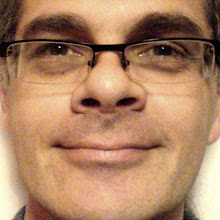At last we reach the final concert. A game of two halves, first up being some of the youngest composers at the Academy, from the YouthWorks programme. Barnaby Archer's Winter Sun was a sequencer piece, played back on CD, which sounded like three minimalists in a phone booth fighting over a laptop. Scott Lygate's The Forest was as virtuoso a display of clarinet writing and playing as one could wish for, while Ryan Young's The Dodgy Smartie was a short and straightforward arrangement of some Scottishy tunes for string quartet. The best bit of Oliver Kearns On Points was the gimmick in the middle; a single note of the piano prepared to sound like a bit like a drum, and hammered away on relentlessly for a while. Club Apocopation by Daniel Walsh was short, and made the ensemble of piano, tuba and piccolo sound quite sensible, really. Finally Jermey Coleman had a Toccata for Clarinet and Piano, again quite a short piece which slipped by painlessly.
The next part of the concert was the biggie, Gordon McPherson's Creative Scotland Award piece Ghosts. Gordon's music these days is - extreme, incomprehensible, verging on the repugnant. Listening to it is a fascinating and appalling experience. What on earth is going on? It's bedlam, chaos, a tangle, a thicket of intertwined and overlapping musical strands. The ear is drawn first towards one baffling instrumental gesture then another, without being able to make any sense of it all.
There are programmatic clues, of a sort. Chopin is linked into the overarching 'voices from the dead' theme through the autobiography of the medium Leslie Flint, who is reported to have manifested the voice of Frédérique Chopin in 1959. Musically the piece is explicitly and audibly derived from the Nocturne No 7 in C# minor Op 27 No 1, wrenched lovingly and violently into a new musical shape.
The Winchester Mystery House is 'about' an absurd mansion built by a Californian heiress under the guidance of spirit voices. The house was under construcion continually for 38 years, with many absurdities, staircases leading nowhere, doors partway up a wall. 'It's a useless house' said Gordon in his pre-concert talk 'and it's a useless piece of music as well'. Again, this makes a sort of sense of what one is hearing; a huge number of seemingly unconnected musical fragments, overlapping, juxtaposed, joined and hanging loose. One can imagine coming back in thirty-eight years time and having this piece of music still going on, relays of players still sawing and banging away...
Spiricom, finally, deals with a loony machine built by a couple of Americans, a kind of valve radio believed to be able tune into the voices of the dead. During the piece we hear recordings of the strange grinding droning noises produced. McPherson's Spiricom is also a strange and unlikely gadget for making ugly grinding noises, composed of instruments and musicians instead of coils and capacitors.
Spiricom - the machine, that is - might have been a hoax. Could the whole of Ghosts be a hoax as well? Is Gordon massively pulling our leg here, and the collective leg of the Scottish artistic establishment? Anyone who knows him will know that he loves the aesthetic of the lie, the hoax, the misdirection, the con. I can easily imagine him deliberately set out to write something which was a pile of nonsense masquarading as high art, just for the personal joy of not merely getting away with it, but getting paid for it. In defence of this interpretation, we have the moment at the end of one of the pieces where, for no apparent reason at all, we hear 'Rock of Ages' played on an offstage harmonium. Surely he's taking the piss?
A little tiny bit, perhaps; but there's more going on here. Lookit, I know Gordon to be an extremely talented musician with a highly developed ear, a composer of huge experience and technical skill, and a person who has listened to and absorbed more music than anyone I have ever met, a living wikipedia of contemporary music. Also, someone with very strong and frequently expressed musical loves and hates, which sometimes take the most unpredictable form. He's as about as far away from being a musical charlatan as one could imagine.
If the music sounds like chaos and nonsense, it is also very carefully composed chaos and nonsense. It's more nonsensical than music could possibly be unless someone went to great effort to write it that way. One might assume that the same musical effect could be got by, for instance, plonking in front of the players a random collection of orchestral parts and asking them to play a bar or two here, a bar or two there, as long as they stayed away from a tune one might recognise. But that wouldn't sound like McPherson. Or, tell them to just do free improv for half an hour; but this music sounds nothing like free improv.
So, we're left with having to take seriously this frequently confusing and sometimes rebarbative sound world. It's not generally a problem when one goes to a gallery and sees an extremely ugly work of art. No-one is going to force you to stand there staring at it for twenty minutes. I've on rare occasions been stuck watching a piece of theatre which made me want to chew my arms off with anger, frustration and boredom, but Ghosts wasn't like that either; it may have been frustrating and deeply puzzling, but it certainly wasn't boring. I kind of liked it.
Sunday, 6 May 2007
Plug VII
Posted by J. Simon van der Walt at 18:31
Subscribe to:
Post Comments (Atom)

0 comments:
Post a Comment